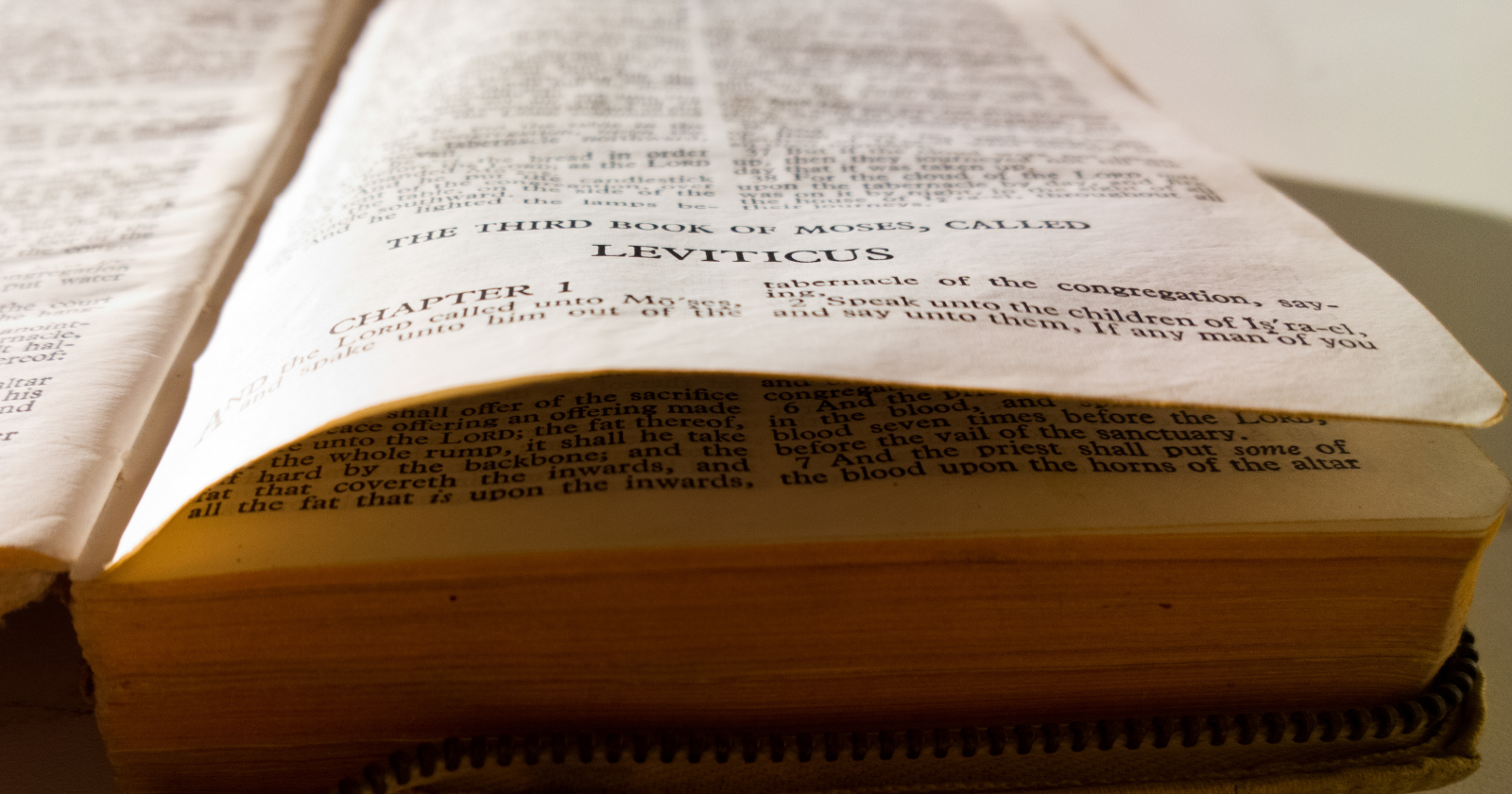“Speak to the entire assembly of Israel and say to them: ‘Be holy because I, the Lord your God, am holy.'”
Leviticus 19:2
Even though the Book of Leviticus is usually perceived as a challenging part of the Bible, it’s crucial for understanding holiness and divine laws.
Leviticus stands as a testament to the ancient call for purity, devotion, and ethical living.
This scripture is not just a historical or religious artifact. It’s a guide for personal spiritual growth and communal responsibility.
Today, we will overview this book from the Law of Moses, summarize its key themes, and explore how Leviticus shapes our views on modern society and morality.
Overview of the Book of Leviticus
The Book of Leviticus stands as the third book in the Torah and focuses on the concepts of holiness and divine rituals.
Named “Wayiqra” in Hebrew, meaning “and he called,” it emphasizes God’s call for Israel to be a holy nation.
This scripture delves into Jewish liturgical rites, detailing sacrifices, priestly ordinations, purity laws, and the moral obligations of holiness.
It is structured around various offerings and ceremonies. Specifically, it involves:
- Rituals about sacrifices (Chapters 1-7): Guidelines for burnt offerings, grain offerings, peace offerings, sin offerings, and guilt offerings, each with specific instructions for execution.
- Ceremony of ordination for priests (Chapters 8-10): Chronicles the consecration of Aaron and his sons, marking the establishment of the priesthood.
- Laws of purity (Chapters 11-16): Encompasses dietary laws, purification rites after childbirth, and regulations for managing various forms of impurity.
- The holiness code (Chapters 17-26): A collection of laws aimed at guiding the Israelites towards a holy life, covering moral, ethical, and ritualistic behaviors.
- Laws on vows, tithes, and national festivals (Chapter 27 and various sections): Addresses the handling of personal vows and tithes, along with detailed observance instructions for the Lord’s festivals.
Keep in mind that the central theme of the book is the concept of holiness, which is mentioned 77 times. This underscores the call to “Be holy, for I am holy.”
6 core themes in Leviticus
1) Holiness and divine rituals
Leviticus challenges us to understand and embody holiness — a concept deeply woven into every chapter of his book.
This book sets a high standard for moral and spiritual purity, not just for the priests or Levites but for the entire community of believers.
But what does it mean to be holy?
At its core, holiness is about being set apart and distinct — reflecting the very nature of God Himself.
Leviticus paints a vivid picture of this divine call, inviting the Israelites to embody holiness in every aspect of their lives.
In his book, the notion of holiness permeates through:
- Rituals and sacrifices that signify purity and devotion.
- Laws that guide moral and ethical behavior towards others.
- Festivals that celebrate God’s providence and covenant with His people.
As you can see, holiness, as depicted in Leviticus, is multifaceted — encompassing personal conduct, community relations, and spiritual practices.
Through Leviticus, we learn that to be holy is to live in a way that honors God, respects others, and cherishes the world He has created.
2) Why sacrifices matter
“For the life of the flesh is in the blood, and I have given it to you on the altar to make atonement for your souls; for it is the blood that makes atonement by the life.”
Leviticus 17:11
At first glance, the detailed instructions for sacrifices in Leviticus might seem distant and irrelevant.
But, what if these rituals offer us a deeper understanding of atonement, repentance, and the cost of sin?
The sacrifices outlined in Leviticus chapters 1-7 underscore the seriousness of sin and the lengths to which God goes to restore fellowship with His people.
These chapters describe various offerings and each of them has specific instructions regarding the animal or food to be offered.
These rituals were not mere religious formalities but were imbued with deep spiritual significance, representing themes of repentance, thanksgiving, and consecration to God.
- Burnt offerings: Symbolizing total surrender to God.
- Grain offerings: Representing acknowledgment of God’s provision.
- Peace offerings: Expressing fellowship and peace with God.
- Sin offerings and guilt offerings: Facilitating atonement and restitution for sins.
The sacrifice system, particularly through the offering of blood, symbolizes the deep cost of sin and the lengths to which God goes to restore fellowship with humanity.
You can even think of it as a tangible expression of repentance and a vivid reminder that redemption requires sacrifice.
This principle echoes throughout Scripture, finding its fulfillment in the New Testament through Jesus’ ultimate sacrifice.
3) Laws of purity
Leviticus chapters 11-16 delve into the extensive laws regarding legal and ritual purity.
These sections outline a variety of purity laws, ranging from dietary restrictions to regulations on handling bodily discharges and skin diseases.
Interestingly, the concept of purity in Leviticus is not limited to physical cleanliness but is deeply intertwined with holiness and the ability to approach the sacred space of the Tabernacle.
For instance, the dietary laws detailed in Chapter 11 distinguish between clean and unclean animals. This prescribes what is permissible to eat for those who are part of God’s holy nation.
The laws on leprosy and other skin diseases, as well as regulations concerning menstrual and seminal discharges, may seem distant to the modern reader.
However, they reflect a profound understanding of the need for physical purity in religious practices and the presence of God.
Furthermore, these purity laws served to instill a sense of communal health and well-being, emphasizing the importance of cleanliness and caution against diseases.
4) Community and individual responsibility
While Leviticus might seem like a collection of ancient rituals irrelevant to modern life, it introduces a counterintuitive idea:
The individual’s actions affect the community’s well-being and vice versa.
Through rules about purity, dietary laws, and social justice (like helping the poor and loving one’s neighbor), it teaches that personal holiness contributes to communal health.
What is the purpose of this perspective?
Well, it invites us to see our lives as interconnected webs of relationships where our choices have wider implications beyond our immediate selves.
5) Understanding of love
I’m sure that Leviticus isn’t the first book that comes to mind when you think of love.
However, nestled within its laws and commands is a profound understanding of love — both divine and human.
First of all, this book challenges us to love our neighbor as ourselves, and therefore, it sets a foundational principle that transcends time and culture.
“Love your neighbor as yourself” (Leviticus 19:18) poses a simple yet profound question about the nature of love in action.
Could this ancient command be the key to navigating today’s complex social landscapes?
Let’s pause for a moment.
Imagine a world where this principle of love governs every interaction.
What changes might we see in our communities, our families, and even within ourselves?
Leviticus invites us to explore the depth of love beyond mere feelings, urging us to act justly and care deeply for those around us.
6) Festivals and sacred times
And the final significant theme in the book of Leviticus is festivals and sacred times.
The thing is that Leviticus introduces us to a rhythm of life marked by celebrations and solemn observances, from the weekly Sabbath to the Year of Jubilee.
But why do these times matter?
That’s because they’re not just breaks from the routine — they’re opportunities to remember, rejoice, and reconnect with the foundational stories of faith and freedom.
In fact, Leviticus details the observance of various festivals like Passover, Pentecost, and the Day of Atonement, highlighting their significance in Israelite worship and community life.
Other than being just historical commemorations, these festivals are opportunities for renewal and recommitment to God.
They serve as reminders of God’s provision, protection, and forgiveness.
Leviticus in the New Testament
Although Leviticus is an Old Testament book, its teachings and rituals find profound echoes in the New Testament.
As a matter of fact, this book helps us understand Christ’s life, death, and teachings.
For example, the sacrificial system outlined in Leviticus points forward to Jesus Christ as the ultimate sacrifice for sin. His fulfillment of these rituals affirms their significance while opening a new way to approach God through grace.
What’s more, Christ’s commandment to “love your neighbor as yourself” directly quotes Leviticus 19:18, which highlights the continuity between Old Testament law and New Testament ethics.
This principle becomes central to Christian moral teaching, emphasizing love as the fulfillment of the law.
Furthermore, Leviticus’ emphasis on holiness is reimagined in the New Testament teaching that believers are to be holy as God is holy, reflecting His character in their lives.
In particular, the book of Hebrews emphasizes Jesus as the high priest who enters once and for all into the Holy Place.
Through these connections, Leviticus serves as a foundational text that enriches understanding of New Testament themes such as sacrifice, atonement, holiness, and love.
Final thoughts: Living a life of holiness
To sum up, the call to holiness is at the heart of Leviticus and remains a powerful directive for Christians today.
It’s a reminder that our lives are to be set apart, and dedicated to God in both our actions and our intentions.
Leviticus offers a blueprint for achieving this through adherence to God’s laws, acts of kindness, and maintaining purity in our daily lives.
So, how you can live a life of holiness as a Christian?
- Embrace rituals that draw you closer to God and recognize them as opportunities for spiritual renewal.
- Practice compassion and generosity, especially towards those in need.
- Uphold integrity in your personal and communal relationships; avoid actions that harm others or dishonor God.
Finally, just consider this scripture an invitation to continual growth which encourages us to evaluate and adjust our behaviors in pursuit of a deeper relationship with the Divine.
Through Leviticus, we learn that holiness is not an unreachable ideal but a daily journey of faithfulness and devotion.













